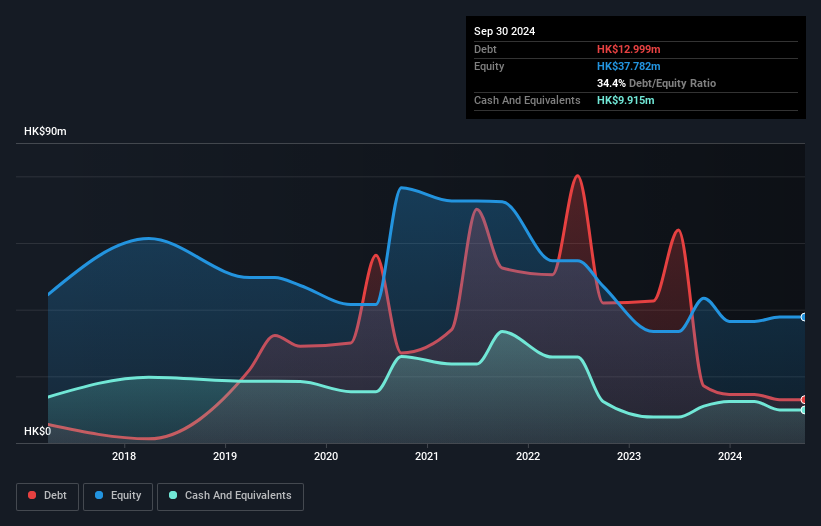
Legendary fund manager Li Lu (who Charlie Munger backed) once said, 'The biggest investment risk is not the volatility of prices, but whether you will suffer a permanent loss of capital.' When we think about how risky a company is, we always like to look at its use of debt, since debt overload can lead to ruin. We note that Asia-express Logistics Holdings Limited (HKG:8620) does have debt on its balance sheet. But is this debt a concern to shareholders?
Why Does Debt Bring Risk?
Debt and other liabilities become risky for a business when it cannot easily fulfill those obligations, either with free cash flow or by raising capital at an attractive price. In the worst case scenario, a company can go bankrupt if it cannot pay its creditors. However, a more frequent (but still costly) occurrence is where a company must issue shares at bargain-basement prices, permanently diluting shareholders, just to shore up its balance sheet. Of course, the upside of debt is that it often represents cheap capital, especially when it replaces dilution in a company with the ability to reinvest at high rates of return. When we examine debt levels, we first consider both cash and debt levels, together.
See our latest analysis for Asia-express Logistics Holdings
What Is Asia-express Logistics Holdings's Debt?
You can click the graphic below for the historical numbers, but it shows that Asia-express Logistics Holdings had HK$13.0m of debt in September 2024, down from HK$17.1m, one year before. However, it does have HK$9.92m in cash offsetting this, leading to net debt of about HK$3.08m.

A Look At Asia-express Logistics Holdings' Liabilities
According to the last reported balance sheet, Asia-express Logistics Holdings had liabilities of HK$62.5m due within 12 months, and liabilities of HK$13.2m due beyond 12 months. Offsetting these obligations, it had cash of HK$9.92m as well as receivables valued at HK$48.1m due within 12 months. So its liabilities total HK$17.6m more than the combination of its cash and short-term receivables.
This deficit isn't so bad because Asia-express Logistics Holdings is worth HK$61.8m, and thus could probably raise enough capital to shore up its balance sheet, if the need arose. However, it is still worthwhile taking a close look at its ability to pay off debt. When analysing debt levels, the balance sheet is the obvious place to start. But you can't view debt in total isolation; since Asia-express Logistics Holdings will need earnings to service that debt. So if you're keen to discover more about its earnings, it might be worth checking out this graph of its long term earnings trend.
In the last year Asia-express Logistics Holdings wasn't profitable at an EBIT level, but managed to grow its revenue by 2.9%, to HK$348m. We usually like to see faster growth from unprofitable companies, but each to their own.
Caveat Emptor
Over the last twelve months Asia-express Logistics Holdings produced an earnings before interest and tax (EBIT) loss. To be specific the EBIT loss came in at HK$5.3m. Considering that alongside the liabilities mentioned above does not give us much confidence that company should be using so much debt. So we think its balance sheet is a little strained, though not beyond repair. For example, we would not want to see a repeat of last year's loss of HK$5.8m. In the meantime, we consider the stock very risky. The balance sheet is clearly the area to focus on when you are analysing debt. However, not all investment risk resides within the balance sheet - far from it. For example - Asia-express Logistics Holdings has 2 warning signs we think you should be aware of.
Of course, if you're the type of investor who prefers buying stocks without the burden of debt, then don't hesitate to discover our exclusive list of net cash growth stocks, today.
Have feedback on this article? Concerned about the content? Get in touch with us directly. Alternatively, email editorial-team (at) simplywallst.com.
This article by Simply Wall St is general in nature. We provide commentary based on historical data and analyst forecasts only using an unbiased methodology and our articles are not intended to be financial advice. It does not constitute a recommendation to buy or sell any stock, and does not take account of your objectives, or your financial situation. We aim to bring you long-term focused analysis driven by fundamental data. Note that our analysis may not factor in the latest price-sensitive company announcements or qualitative material. Simply Wall St has no position in any stocks mentioned.